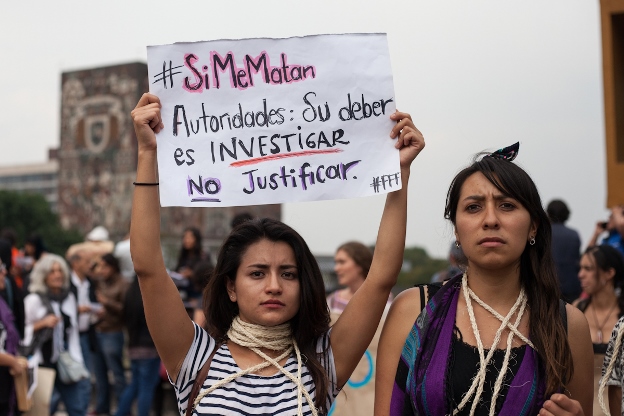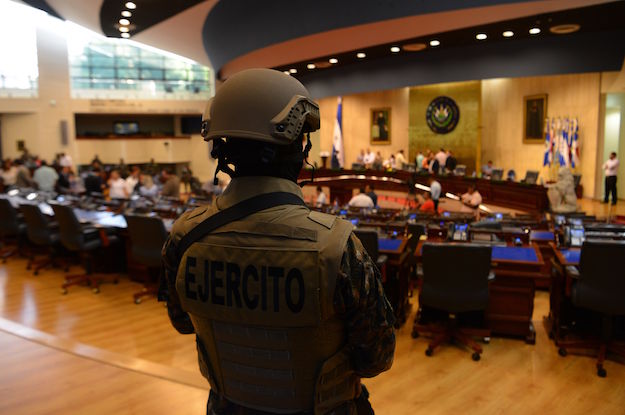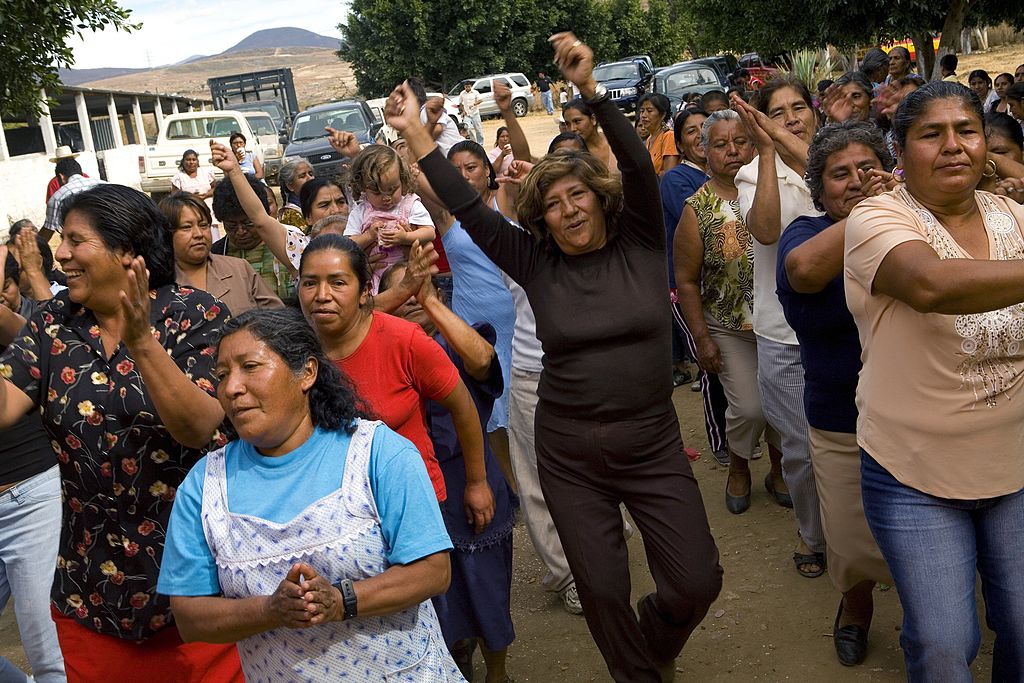Shortly after Lesvy Berlin Osorio was found strangled to death on the campus of Mexico’s largest university – the National Autonomous University of Mexico (UNAM) – the office of the public prosecutor began to denigrate the 22-year-old woman on Twitter. She consumed drugs and alcohol, had dropped out of high school, and lived with her boyfriend, they tweeted.
The violence Berlin suffered is not new: An average of seven women are killed in Mexico a day. Neither was the implication that the victim was to blame. National newspapers soon reproduced the public prosecutor’s tweets in headlines. The outrage that followed, however, followed the mold of other recent and high-profile social media campaigns that have targeted the sexism behind the high femicide rates in the region.
Angered by the victim-blaming, women in Mexico City began to tweet under the hashtag #SiMeMatan (if they kill me), describing how they might be blamed in their own murder. Soon, the hashtag was a trending topic in Mexico and beyond as tens of thousands of women across Latin America joined the protest.
#SiMeMatan seguro dirán que es porque lo provoqué, por caminar en la calle, por respirar, por atreverme a nacer mujer y serlo orgullosa
— Aline Ross (@AlineRossG) May 5, 2017
“If they kill me, surely they will say I provoked it, for walking alone, for breathing, for daring to be a proud woman.”
#SiMeMatan dirán que fue porque era muy coqueta, porque viajo sola con mis amigas o porque dije que NO cuando él quería que fuera un sí.
— Katia Bosque (@Katiabosque09) May 5, 2017
“If they kill me, they will say it was because I was flirtatious, because I travel alone with my female friends, and because I said no when he wanted me to say yes.”
The virtual protest had concrete results: Shortly after #SiMeMatan went viral, the prosecutor’s office took down the incriminating tweets. Public prosecutor Rodolfo Ríos tweeted that the posts had been an error.
Jamás, la conducta, la vida privada o la condición social de una víctima afectará una investigación.He instruido rectificar este grave error
— Rodolfo Ríos (@rodolforiosg) May 5, 2017
“The conduct, private life or social condition of a victim will never effect an investigation. I have instructed them to rectify this grave error.”
University director Enrique Graue issued a statement about Berlin’s murder, saying “I feel in debt to the university community for not being capable of eliminating this unacceptable reality.”
This strategic use of social media by women to build a broad network around shared concerns and push for specific, local action is rippling across the region, and sometimes to great effect, said Mariana Berlanga, a researcher with the Autonomous University of Mexico City (UACM).
“Social networks are working as a powerful medium that allows us to generate a critical collective voice across Latin America,” Berlanga told AQ.
The Twitter users in Mexico were following a model other women have successfully used throughout the region. In February 2016, two Argentine backpackers, Marina Menegazzo and María José Coni, were murdered in Ecuador. Their skulls were crushed and their bodies left in bags. When their deaths were blamed on their decision to travel alone – with each other, but without a man – women fought back with the hashtag #yoviajosola (I travel alone).
In Brazil, the hashtag #EstuproNaoÉCulpaDaVitima (rape is not the victim’s fault) surged on Twitter after a 16-year-old girl was allegedly raped by over 30 men and a lead investigator questioned the victim about her sex life. He was removed from the case, and a woman put in charge. Another Brazilian campaign, #PrimeiroAssedio (first harassment), started by NGO Think Olga, led thousands of women to share their first experiences of sexual harassment.
A social media movement in Argentina – the #NiUnaMenos (not one more) campaign – brought hundreds of thousands of people to the streets after the murder of Chiara Páez, a 14-year-old pregnant girl. After the march, reports of gender violence to the Buenos Aires Attorney General’s office increased 25 percent. Argentine presidential candidates – including now-president Mauricio Macri – even used the hashtag in their campaigns to promise an end to violence against women.
Most countries in Latin America have laws against femicide, and the ones that don’t are facing increasing pressure to enact them. While Mexico has the second-longest sentence for femicides in Latin America (40 to 60 years), very few crimes are prosecuted as such. Social media can help change this by amplifying local voices, helping change attitudes and bringing broader public pressure to bear on local officials to enforce existing laws.
In Mexico City, despite the Twitter campaign’s success in pushing back against the public prosecutor, many women felt it was not enough. Later in the day, thousands marched within the university’s campus chanting “In pants or a skirt, respect me!” They laid flowers and notes at the base of the phone booth where Berlin was found and instead of holding a moment of silence, held a minute of resistance, calling for an end to femicide and for a thorough investigation of the case.
Samantha Vargas, a UNAM chemistry student who helped organize the march, said Mexican society does not do enough to combat gender-based violence, and neither does the university. In 2010 Adriana Morlett, a 22-year-old UNAM student, was killed, and to this day, no one has been prosecuted for her murder. The area where Berlin was found was already identified as an unsafe area in 2015 and little was done to improve security. And professors accused of rape or who have publicly justified rape still teach at UNAM, despite student protests, Vargas pointed out.
Even on campus there are students who blame women for the violence they suffer, said Vargas. “This is what happens when the Wi-Fi reaches the kitchen,” another university student commented when Vargas helped organize a strike on International Women’s Day earlier this year.
Much still needs to be done, but to one woman the campaign has already made a difference. Araceli Osorio, the victim’s mother, was moved by the outpouring of support.
“We cannot be a people who live in fear,” Osorio said, holding back tears while addressing the thousands of women who participated in the march. “I ask you to keep protesting in different ways, not just for (my) daughter but for all who no longer have a voice.”
—
Knoll Soloff is a freelance journalist based in Mexico City








